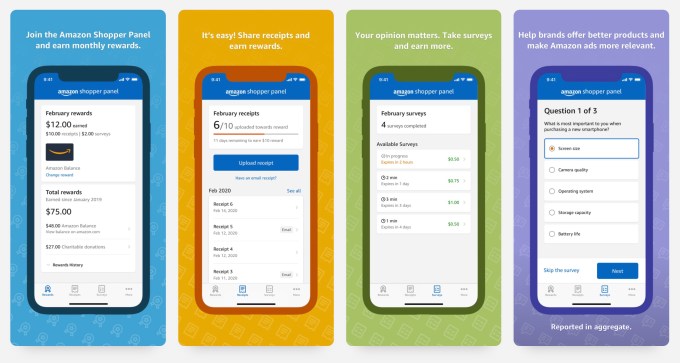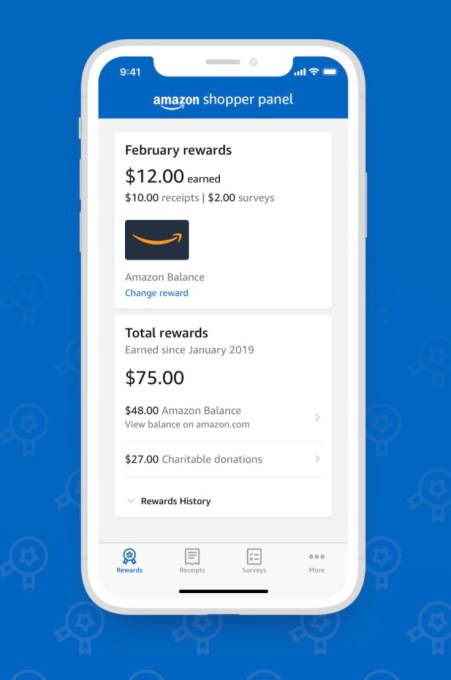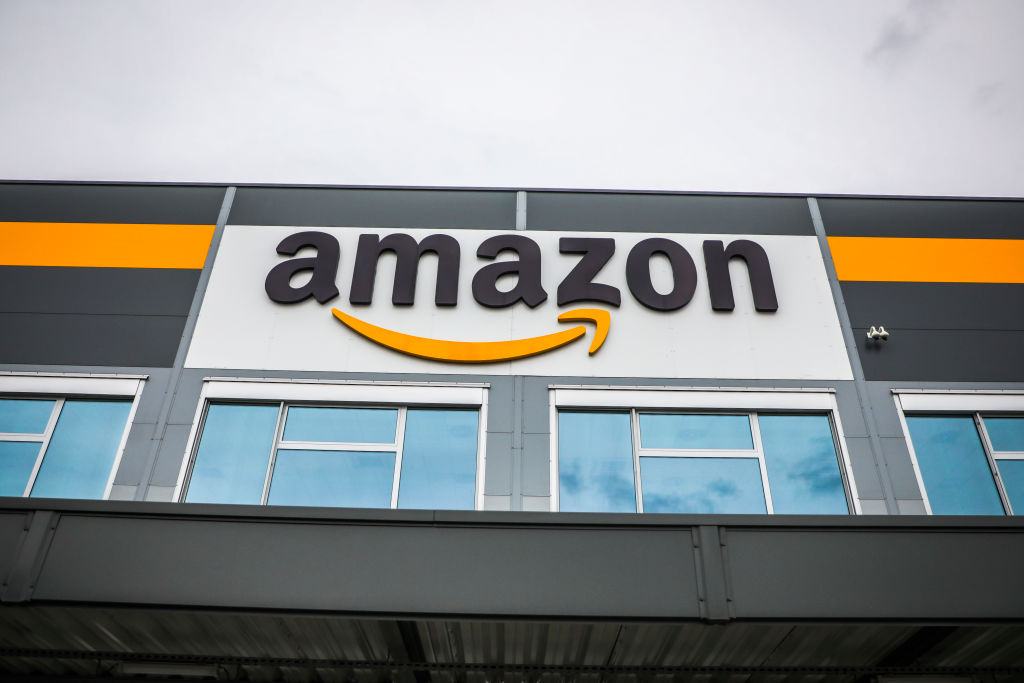Amazon has launched a new program that directly pays consumers for information about what they’re purchasing outside of Amazon.com and for responding to short surveys. The program, Amazon Shopper Panel, asks users to send in 10 receipts per month for any purchases made at non-Amazon retailers, including grocery stores, department stores, drug stores and entertainment outlets (if open), like movie theaters, theme parks and restaurants.
Amazon’s own stores, like Whole Foods, Amazon Go, Amazon Four Star and Amazon Books do not qualify.
Program participants will take advantage of the newly launched Amazon Shopper Panel mobile app on iOS and Android to take pictures of paper receipts that qualify or they can opt to forward emailed receipts to receipts@panel.amazon.com to earn a $10 reward that can then be applied to their Amazon Balance or used as a charitable donation.
Amazon says users can then earn additional rewards each month for every survey they complete. The optional surveys will ask about brands and products that may interest the participant and how likely they are to purchase a product. Other surveys may ask what the shopper thinks of an ad. These rewards may vary, depending on the survey.
The program is currently opt-in and invite-only, and is also only open to U.S. consumers at this time. Invited participants can now download the newly launched Shopper Panel app and join the panel. Other interested users can use the app to join a waitlist for an invite.

Amazon claims it will delete any sensitive information from the receipts users upload, like prescription information. But it doesn’t delete users’ personal information, instead storing it in accordance with its existing Privacy Policy. It will allow users to delete their previously uploaded receipts, if they choose.
Consumer research panels are common operations, but in Amazon’s case, it plans to use the data in several different ways.
On the website, Amazon explains it “may use” customer data to improve product selection at Amazon.com and Whole Food Market, as well as to improve the content selection offered through Amazon services, like Prime Video.
Amazon also says the collected data will help advertisers better understand the relationship between their ads and product purchases at an aggregate level and will help Amazon build models about which groups of customers are likely to be interested in certain products. Amazon may choose to offer data to brands to help them gain feedback on existing products, the website notes.

The program’s launch follows increased scrutiny over Amazon’s anti-competitive business practices in the U.S. and abroad when it comes to using consumers’ purchase data.
Amazon came under fire from U.S. regulators over how it had leveraged third-party merchants’ sales data to benefit its own private label business. When Amazon CEO Jeff Bezos testified before Congress in July, he said the company had a policy against doing this, but couldn’t confirm that policy hadn’t been violated. The retailer may also be facing antitrust charges over the practice in the EU.
At the same time, Amazon has been increasing its investment in its advertising business, which grew by 44% year over year in Q1 to reach $3.91 billion. That was a faster growth rate than both Google (13%) and Facebook (17%), even if tiny by comparison — Google ads made $28 billion that quarter and Facebook made $17.4 billion, Digiday reported.
As the pandemic has accelerated the shift to e-commerce by five years or so, Amazon’s need to better optimize advertising space has also been sped up — and it may rapidly need to ingest more data than what it can collect directly from its own website.
In a message to advertisers about the program’s launch, Amazon positioned its e-commerce business as a small piece of the overall retail market — a point it often makes in hopes of avoiding regulation:
In this incredibly competitive retail environment, Amazon works with brands of all sizes to help them grow their businesses not just in our store, but also across the myriad of places customers shop. We also work hard to provide our selling partners — and small businesses in particular — with tools, insights and data to help them be successful in our store. But our store is just one piece of the puzzle. Customers routinely use Amazon to discover and learn about products before purchasing them elsewhere. In fact, Amazon only represents 4% of U.S. retail sales. Brands therefore often look to third-party consumer panel and business intelligence firms like Nielsen and NPD, and many segment-specific data providers, for additional information. Such opt-in consumer panels are well-established and used by many companies to gather consumer feedback and shopping insights. These firms aggregate shopping behaviors across stores to report data like average sales price, total units sold and revenue on tens of thousands of the most popular products.
The retailer then explained that the Shopper Panel could help it to support sellers and brands by offering additional insights beyond its own store.
Amazon doesn’t say when the program waitlist will be removed, but says anyone can sign up starting today.
COVID-19 pandemic accelerated shift to e-commerce by 5 years, new report says































Comment